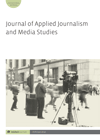
-
oa Ten news value criteria for sustainable journalism
-
-
- 22 Nov 2022
- 08 Feb 2023
- 10 Mar 2023
Abstract
This article argues that journalism scholars and practitioners worldwide should not view 2030, i.e. the year in which the UN Agenda sustainable development goals are to be fulfilled, as a symbolic date, but instead as a real deadline. Such a posture could spur discussion about what more the media could do in these remaining years to promote sustainable development, as well as concrete action. To normatively support such a process in this context, the purpose of this contribution is to suggest news value criteria tailored to manage the challenges of sustainable development. They presuppose a well-functioning relationship between the media’s business and planetary needs. The former concern how to finance journalism and attract audiences/users, while the latter concern what kind of journalism a sustainable world de facto requires. The proposed news value criteria could serve as a point of departure for the development of sustainability-oriented news, which could be jointly tested and configurated by scholars and practitioners.


